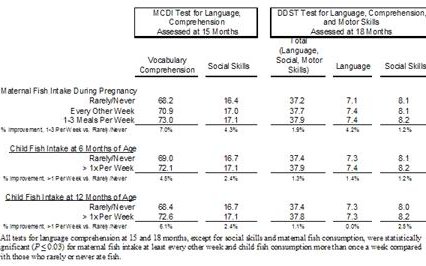The U.S. Tuna Foundation (USTF) is hailing a new study showing that the benefits of seafood consumption strongly outweigh the effects of modest mercury intake during pregnancy and the first two years of a baby's life. Unlike previous studies, this study among pregnant women and their infants in the United Kingdom appears to be the first to examine this risk/benefit relationship in a population with seafood consumption patterns and mercury levels similar to those in the United States.
Conducted by researchers at the U.S. National Institute of Environmental Health Sciences (NIEHS) and published in the July edition of the Journal of Epidemiology, this study assessed the fish intake of more than 7,400 mothers in the United Kingdom (UK) and found that those who ate fish regularly during pregnancy had children with better language and communication skills by the age of 18 months. The study authors concluded that the women's mercury levels, which were comparable to those seen among women in the United States, "were low and were not associated with neurodevelopment." Additionally, the study examined the fish intake of the children at 6 months and a year of age and found that those who ate fish at least once a week had modestly but consistently higher scores than those who did not.
"This study is really a breakthrough for American women because it is the first to look at both the risks and the benefits of fish consumption among pregnant women and children whose seafood consumption patterns and mercury levels are similar to those seen in the U.S.," said Jay Murray, Ph.D., a board-certified toxicologist who specializes in maternal and fetal health and a member of the Tuna Nutrition Council, which advises USTF on nutrition and public health matters. "Other studies have mostly focused on island populations that eat as much as 10 times the seafood consumed by most American women or include fish such as PCB-contaminated whale meat that just aren't seen in the American diet."
Using used standard tests of language, comprehension, motor and social skills to assess childhood development at 15 and 18 months, the study found a subtle but consistent link between eating fish during pregnancy and a child's early cognitive development, even after adjusting for factors such as the age and education of the mother, whether she breastfed, and the quality of the home environment.
Moreover, the study revealed that the amount of fish associated with these cognitive benefits was one to three servings a week, which is consistent with the advice of the Food and Drug Administration (FDA) and the Environmental Protection Agency (EPA) that pregnant women should eat up to 12 ounces a week of fish low in mercury.
As part of their new seafood advisory issued in March, FDA and EPA identified light canned tuna as one of the most commonly consumed types of fish with low mercury levels along with shrimp, salmon, pollock, and catfish. The new government advisory also tells pregnant and nursing women that they can safely eat up to 6 ounces a week of canned albacore tuna. In general, there are up to 2 ounces of albacore in a typical serving.
Health Benefits of Omega-3s During Pregnancy
Federal government and public health groups recommend that women consume canned tuna and other types of seafood during pregnancy because of the beneficial role that the omega-3 fatty acids in fish play during this period. According to numerous studies, DHA (docosahexaenoic acid, an omega-3 fatty acid in fish) comprises approximately 40 percent of the polyunsaturated fatty acid content in the cell membranes in the brain and is transferred from mother to the fetus at a high rate during the last trimester of pregnancy.
“It is important for pregnant and nursing women to understand that the omega-3 fatty acids found in fish are essential during pregnancy and lactation,” said Joyce A. Nettleton, D.Sc., RD, a seafood nutrition expert and] author of Omega-3 Fatty Acids and Health, who is another member of the Tuna Nutrition Council. “Women need to know that eating canned tuna and many other types of fish during pregnancy provides the omega-3 fatty acids that are necessary and best used by the developing fetus to develop and thrive.”
Beyond its role in promoting improved infant development, the omega-3 fatty acids found in canned tuna and most fatty fish help to promote a healthy pregnancy. A recent National Institutes of Health study across 23 countries found that women whose breast milk was rich in omega-3 were less likely to experience postpartum depression. Further, extensive research confirms that the omega-3 fatty acids in canned tuna may prolong gestation, which could reduce the incidence of premature birth.
It is because of these important benefits that FDA and EPA are urging pregnant and nursing women to include fish, such as canned tuna, in their diets while heeding some specific advice about minimizing the small risk to the unborn child from mercury in certain fish. Specifically, the government’s 2004 advisory states “women and young children in particular should include fish and shellfish in their diets due to the many nutritional benefits.” The new advisory also identifies those fish with higher levels of methylmercury, which should be avoided by pregnant and nursing women and young children. These fish include shark, swordfish, tilefish and king mackerel.











